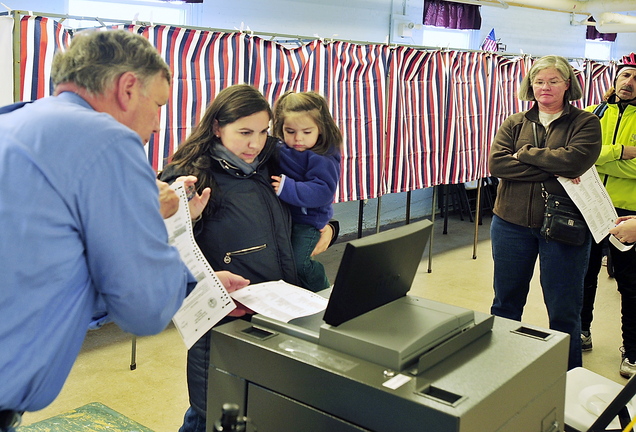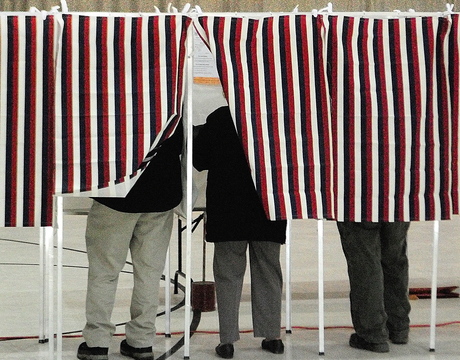Voter turnout across Maine was reported to be light Tuesday, with no compelling statewide issues driving people to the polls.
Secretary of State Matthew Dunlap visited 10 polling places from Freeport to Bangor, and said local election officials reported small turnouts.
Three exceptions were Freeport, Portland and South Portland, where contentious local ballot questions generated heavy voter turnout.
Freeport’s town clerk told Dunlap that she was predicting turnout of more than 50 percent as residents decided whether to spend $16.3 million on high school renovations and improvements to the school department’s running track.
“If there was a hot local issue, then we saw a larger voter turnout,” Dunlap said. “The turnout in those towns without a local ballot question was quite light.”
Dunlap predicted statewide voter turnout of 15 to 25 percent — about 150,000 to 250,000 people. That is significantly less than the 75 percent voter turnout a presidential election typically generates.
“Most of the time we are a pretty civic-minded state, but in a bond election you just don’t have the resources to promote your cause,” Dunlap said. “A lot of people may not have known there were five (state) bond questions on the ballot.”
Dunlap said more than 200 Maine cities and towns used new optical scan tabulators to count ballots Tuesday. For the most part, the machines, leased from a Nebraska company, worked well. Dunlap said voters may have encountered some delays as election officials got familiar with the machines and worked through some startup glitches.
“The time it took to cast a ballot may have been slower than usual,” he said.
That was the case at the Saint Pius X polling place on Ocean Avenue in Portland, where Barbara Bauer said she was “shocked” to see a long line of voters waiting to feed their ballots into the machine. She voted around 5:45 p.m.
“The line was so long that it curled around the voting stations,” Bauer said.
By late Tuesday afternoon, the turnout was described as steady in Westbrook, where three candidates were running for mayor and there were contested City Council and School Board seats.
City Clerk Lynda Adams said turnout there was generally good for an off-year election but the total will probably be down slightly from past years because of a lack of major state issues on the ballot.
A steady stream of voters headed into the South Portland Community Center in the morning, with many saying they were drawn by a proposal that would prohibit so-called tar-sands oil from being shipped through the waterfront or transmitted from Canada via the Portland-to-Montreal pipeline.
In Portland, voters turned out for City Council and School Board races, along with a proposal to legalize possession of small amounts of marijuana.
Mark Potter, the warden of South Portland’s Community Center precinct, said he expected a pretty good turnout because of the waterfront proposal.
He said there was a steady line to cast ballots, largely because of new voting machines that alert voters if they’ve submitted improper ballots, such as voting for more people than allowed in a race. The machines take about 10 to 15 seconds to determine if the ballot is flawed, Potter said, and many voters waited to make sure there was no problem before moving on, causing a slight backup.
He also said voters had to fill out two ballots, one for local issues and races, and a statewide ballot for bond issues.
The Waterfront Protection Ordinance seemed to be uppermost in the minds of many South Portland voters.
John McCall and Andrea McCall said they voted for the ordinance because a spill of tar-sands oil could be devastating.
John McCall said he had researched the proposal and still was a bit confused by the claims of the ordinance’s supporters, who said it was needed to prevent tar-sands oil from flowing through the port, and opponents, who said passage could cost jobs.
Andrea McCall said she thought the proposal may have been too restrictive, “but better to err on the side of the environment.”
Susan Henderson and Scott Hatch said they both voted for the ordinance after initially being unsure about it. Tom D’Andrea said he, too, thinks the city should adopt the proposal to protect the environment.
D’Andrea said he also turned out to oppose a proposed $14 million bond for a new municipal services building. D’Andrea said the local government has too much debt.
Edward D. Murphy can be contacted at 791-6465 or at: emurphy@pressherald.com
Copy the Story LinkSend questions/comments to the editors.





Success. Please wait for the page to reload. If the page does not reload within 5 seconds, please refresh the page.
Enter your email and password to access comments.
Hi, to comment on stories you must . This profile is in addition to your subscription and website login.
Already have a commenting profile? .
Invalid username/password.
Please check your email to confirm and complete your registration.
Only subscribers are eligible to post comments. Please subscribe or login first for digital access. Here’s why.
Use the form below to reset your password. When you've submitted your account email, we will send an email with a reset code.